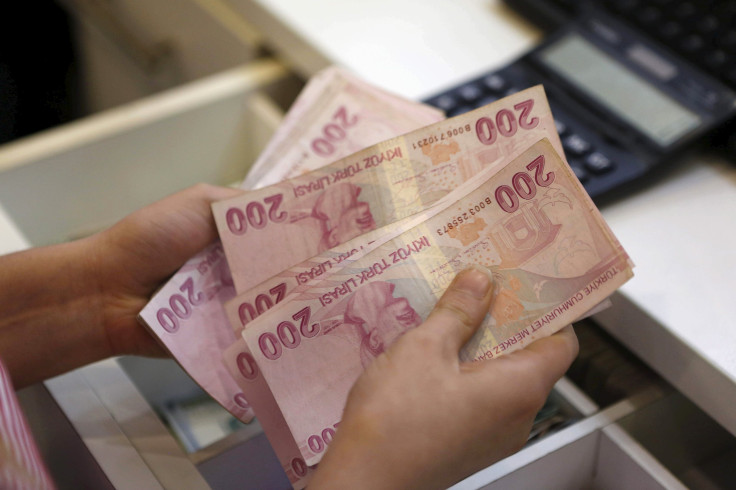How Russia Plane Crisis Could Hurt Turkey's Economy: Lira Falls After Country Downs Russian Warplane

The news of a Turkish fighter jet downing a Russian plane Tuesday could signal a further slump in the country’s already embattled economy, as it balances its two-pronged war with Kurdish militants and Islamic State group fighters in Syria with rapidly increasing tensions with Russia, the country’s No. 2 trading partner. Turkey’s lira weakened the most out of 24 currencies across emerging markets Tuesday, depreciating 0.6 percent to 2.8679 against the U.S. dollar, Bloomberg reported. Turkish stocks and bonds also fell, while the country’s central bank left interest rates unchanged.
Turkey has already been suffering an economic downturn resulting from heightened political instability as it continues to struggle against rising threats from ISIS in Syria, and after it recently reignited a decades-long war with Kurdish militants in the southeastern portion of the country. After an unprecedented spurt of economic growth in the early 2000s, Turkey has seen rising inflation, slowing growth, increased fiscal expenditures, high unemployment and a drop in export competitiveness in recent months. Its GDP is expected to grow only three percent in 2015 and 2016, Foreign Policy reported earlier this year. Even Turkey's newly reappointed finance minister Mehmet Sismek said in September that the country’s financial future was at risk from the growing political instability.
Despite Turkey’s lagging economy, trade with Russia has been strong in recent years, even considering the countries’ longstanding disagreements over how to handle Syria and its leader Bashar Assad. The Russian government has said trade with Turkey jumped to more than $32.7 billion in 2013, and Moscow is set to build and fully fund a $20 billion nuclear plant in Turkey.
But the deepening rift between the two countries had already begun to show hours after Turkey brought down a Russian warplane Tuesday, with Russian President Vladimir Putin calling the incident a “stab in the back” that “will have significant consequences” for Turkey. Soon afterwards, Russian lawmaker Nikolay Levichev asked the Federal Aviation Agency to consider a ban on flights to Turkey, Russian news agency TASS reported. One of Russia’s biggest tour operators, Natali Tours, also announced it would suspend its sales packages to Turkey without specifying when they might resume.
Analysts said investors will be waiting for any signs of escalation between Russia and Turkey. “Events like this cause some nerves across the market,” Koon Chow, macroeconomics and foreign exchange strategist at UBP, told the Financial Times. “Attention will turn to repositioning ahead of the big monetary policy calls at the Federal Reserve and in the eurozone in December, and they are having such a major effect that the impact of geopolitical tensions can be smoothed out more quickly.”
Amid Tuesday's chaos, the Turkish government also announced a new cabinet that raised eyebrows among investors for excluding a highly regarded politician from the finance minister position. Ali Babacan, Turkey's former deputy prime minister, was widely anticipated to be a key figure in the fight to pull the country out of its economic troubles, but Prime Minister Ahmet Davutoglu announced the job would go to former Turkish finance minister Mehmet Simsek instead. Babacan was known for previously heading the country’s $720 billion economy during the initial 13-year tenure of the Justice and Development (AK) party, which was re-elected this month.
“The fact that Babacan is missing is certainly a concerning fact,” Roxana Hulea, a foreign-exchange strategist at Societe Generale, told Bloomberg Tuesday. “Simsek is an encouraging name to see in the lineup, though his ability to bridge ideological differences in the absence of Babacan is yet to be tested."
© Copyright IBTimes 2024. All rights reserved.





















